Want to build a good reputation in the marketing world? High-quality content is the core of a successful marketing campaign. It helps a business gain trust and recognition as an industry expert. That’s why there are a lot of content marketing tools designed to help businesses grow and attract more customers.
If you are looking for an effective way to improve your content marketing strategy, these tools can be helpful. Whether you are a small business or a professional company, these tools can help optimize your content marketing efforts, enhance productivity, and achieve better results in reaching and engaging your target audience.
What Are Content Marketing Tools?
Have you ever felt desperate, not knowing what to do with your content marketing? Well, there are some marketing tools available to give you a hand.
Content marketing tools are software, platforms, or applications created to help marketers with content creation, management, and optimization for their campaigns. They offer various features to manage and create high-quality content, distribution, and analysis. So businesses can attract and engage their target audience effectively.
Why Should We Use Content Marketing Tools?
According to what we said earlier, content marketing is necessary for promoting a brand’s products and services even for small businesses. To succeed, you need the right technology and tools to support your strategy. It helps a business become a trustworthy authority in its industry. Surprisingly, digital marketers prioritize content creation.
In the following, we’re going to discuss the top content marketing tools to help you choose the best one.
Best Content Marketing Tools
Now that you know how content marketing tools can help you boost and enhance your online presence, let’s check some of the top ones available in the market. Here are some of the best tools that can help you in your strategy.
1. Semrush
Let’s start with with one of the most known content marketing tools that has been around since 2008. Semrush Holdings is an American online visibility management and content marketing SaaS (Software as a service) platform. This company has served over 10M users from 143 countries over the past 15 years.
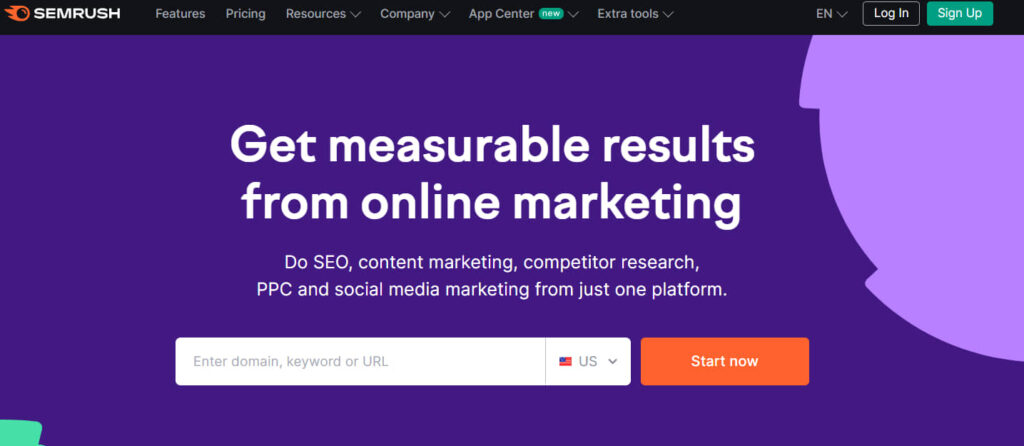
Oleg Shchegolev and Dmitri Melnikov are the founders of this company who started their work as SEO enthusiasts. As one of the top content marketing software tools, this company has over 1,000 employees.
Semrush Features
Undoubtedly, Semrush is one of the best content marketing tools that offers more than 50 features for professionals. On this platform, you can find different tools for SEO, content, advertising, competitive research, agency growth kits, and social media tools.
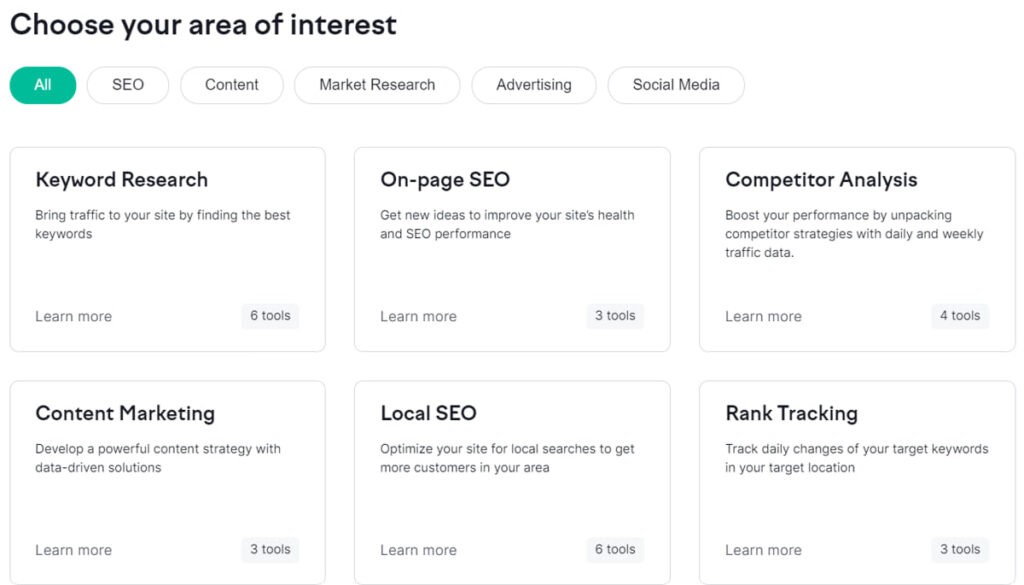
Here are some of the top SEO tools offered by Semrush:
- Backlink Analytics,
- Backlink Gap,
- Domain Overview,
- Link Building Tool,
- Keyword Magic Tool,
- On-Page SEO checker,
- Organic Traffic Insights.
Semrush Pricing
If you want to try one of the best content marketing tools, you should be able to afford the price. Semrush is a bit pricy but you will have everything you need for your business. Here is the pricing of its plans:
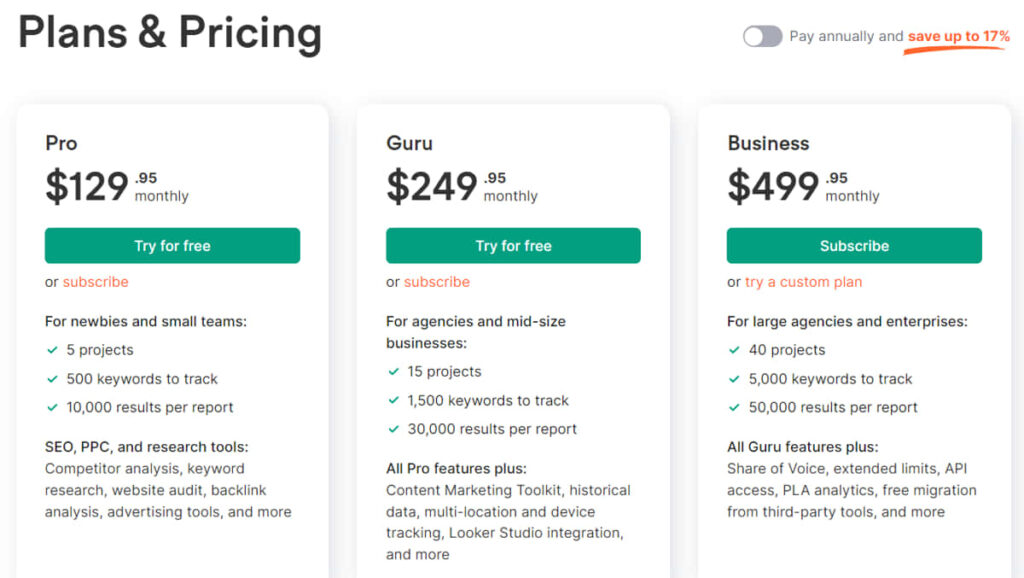
- Pro: $129.95 monthly – 5 projects/ 500 keywords to track/ 10,000 results per report
- Guru: $249.95 monthly – 15 projects/ 1,500 keywords to track/ 30,000 results per report
- Business: $499.95 monthly – 40 projects/ 5,000 keywords to track/ 50,000 results per report
2. Question DB
If your main concern is finding top keywords and question phrases to optimize your content SEO, QuestionDB is one of the best content marketing tools to try. QuestionDB is a content discovery tool that allows you to search for top searched questions around your topic. You can get the best blog topic ideas and related keywords in less than a minute.
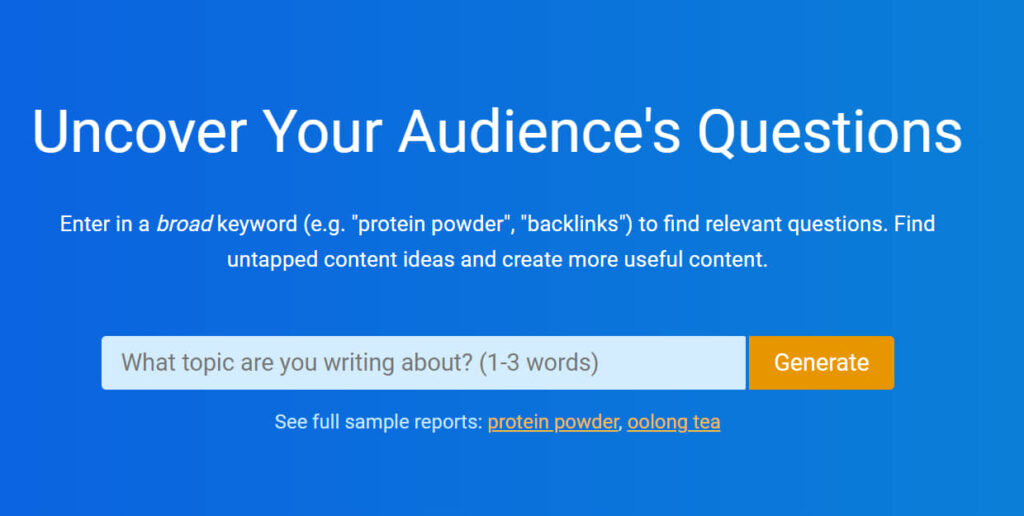
Question DB Features
As we mentioned, QuestionDB is one of the content marketing tools that focuses on a specific goal. This platform has a database of more than 32,137,111 questions and it will also suggest the best blog topics for you.
Question DB Pricing
The best part of using QuestionDB is that it offers a free version so everyone can use it with any budget. If you want to access more searches, you can purchase these plans:
- Solo plan: $15/month – 100 searches/month
- Agency: $50/month – 500 searches/month
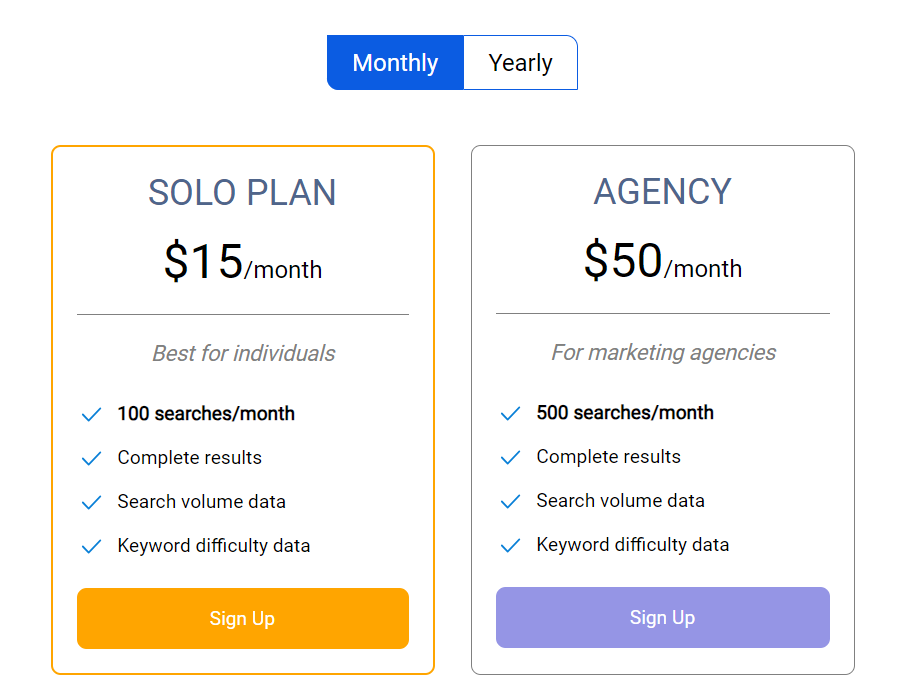
3. BuzzSumo
If you are a social media influencer who is out of post ideas, Buzzsumo can help you. Buzzsumo is one of the top content marketing tools found in 2014 that has helped thousands of businesses and individuals worldwide. This service helps customers to create engaging content, monitor their brand and industry, and discover growth opportunities for their business.
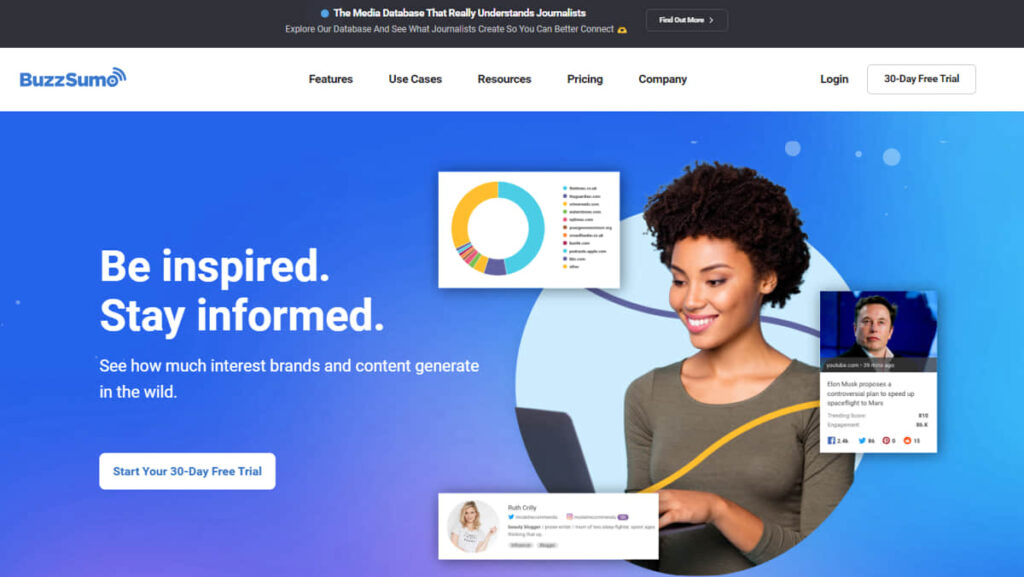
BuzzSumo Features
When it comes to new ideas for your content on social media, there is no better platform than Buzzsumo. Here is what it offers:
- Content Discovery: Spark content ideas by browsing topics, trends, and forums.
- Content Research: BuzzSumo scans billions of articles and social posts so you can harvest meaningful insights.
- Find Influencers: Identify authors and creators with engaged audiences and genuine authority on Instagram, Twitter, and the web.
- Monitoring: Monitor your competitors, brand mentions, and industry updates.
BuzzSumo Pricing
If you’re not sure about using this service, you can try the 30-day free trial. Then you can choose one of the plans below:
- Content Creation: $199 /mo – For marketers and marketing agencies wanting to take their content to the next level.
- PR & Comms: $299 /mo – For agencies needing to monitor coverage, research, and outreach to journalists, and track trends.
- Suite: $499 /mo – Ideal for the entire marketing team in large brands and agencies.
- Enterprise: $999 /mo – No-holds-barred access. Everything household-name brands and agencies need.
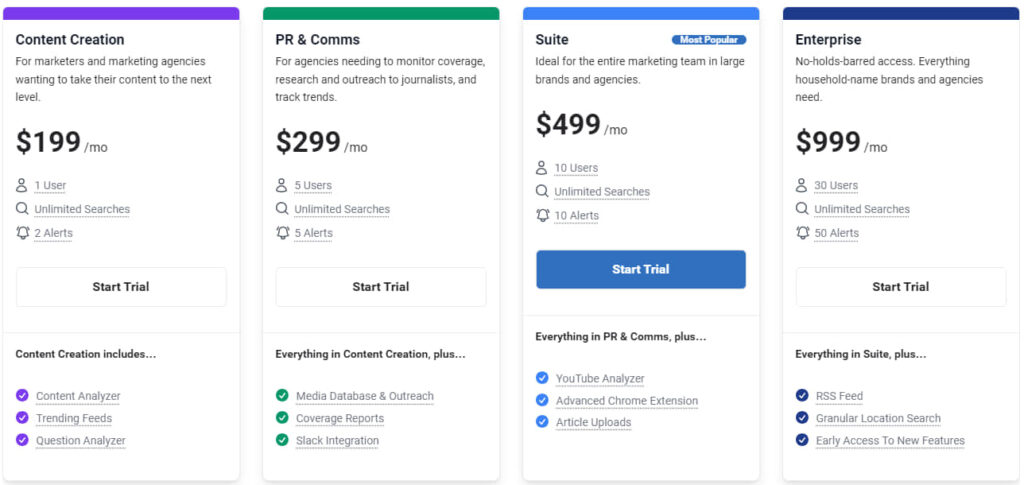
4. MixKit
If you want to share video content and are looking for high-quality stock videos and ready templates, Mixkit is where you need to check. As one of the best content marketing tools, MixKit provides thousands of licensed music, sound effects, and videos. It also doesn’t require signup and you can create fresh content in a blink.

MixKit Features
One of the best tools you need for video marketing is MixKit. Let’s see what it offers:
- Unlimited Videos: You can find hundreds of videos across different topics including nature, lifestyle, business, animals, etc.
- Soundtracks: If you want to add music to your videos, search across the licensed MixKit audio library. It includes funk, Hip-Hop, Jazz, etc.
- Sound Effects: To make your video engaging, make sure to add sound effects where it’s necessary.
- Video Templates: You can easily create videos with ready templates including transition effects, different filters, etc.
MixKit Pricing
If you are low in budget, one of the available content marketing tools for you is MixKit. You can use all of its features to create high-quality videos for free.
5. Topic Ranker
Are you looking for an effective way to be ahead of your competitors? Topic Ranker is one of the best content marketing tools that can help you. Topic Ranker is an Online marketing platform founded by Dmitry Dragilev in 2012. This tool helps you monitor your competitors and find easy-to-rank keywords based on competitor weak spots on search engine results.
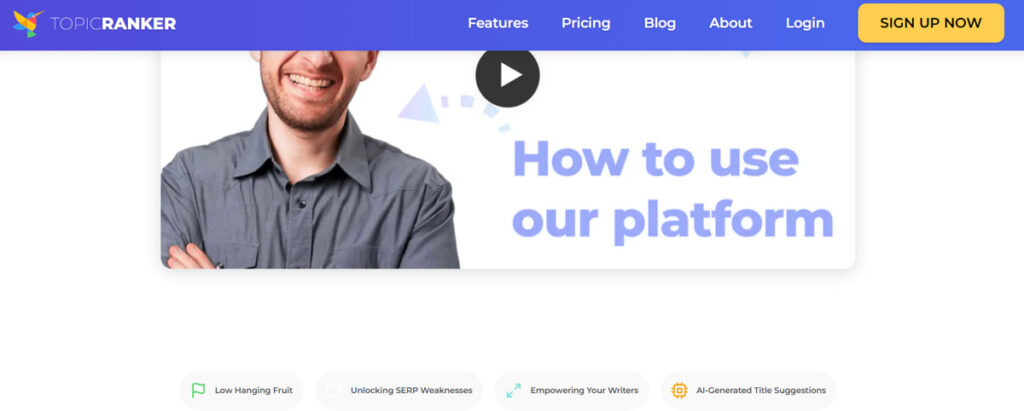
Topic Ranker Features
If you want your content and blog posts to appear on Google search results, Topic Ranker is one of the best tools for you. Let’s see some of its content marketing tools:
- Unlocking SERP Weaknesses: Find the top-ranking pages for your keyword and find their weaknesses.
- AI-Generated Title Suggestions: Titles play an important role in ranking your article. Find out how to write a title that ranks.
- AI-Assisted Content Outlines: Instead of searching manually, this tool checks the top articles and writes outlines for
- AI-Powered Blog Posts: After finding the title and keywords, let the tool write a high-quality blog post for you.
Topic Ranker Pricing
One of the cost-effective content marketing tools for writing blog posts is Topic Ranker. By paying only $9 monthly, you can start using this tool. Here are the packages it offers:
- Starter: $9 / mo – 3 analysis reports limit per month/ No AI tools
- Basic: $59 / mo -10 analysis reports limit per month/ AI Assisted Writing Tools
- Premium: $129 / mo -30 analysis reports limit per month/ AI Assisted Writing Tools/ Academy access: Top PR & SEO outreach tactics
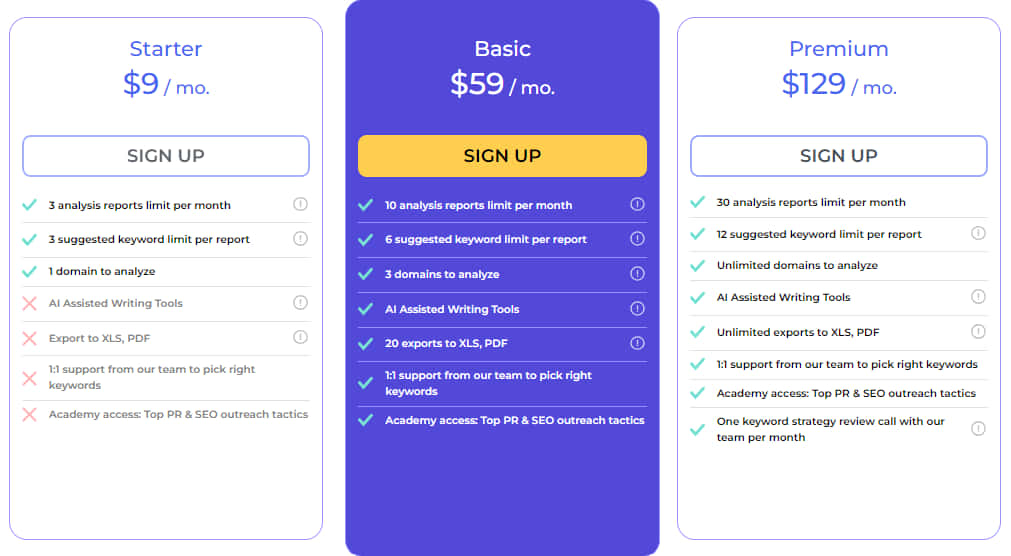
Content Marketing Analytics Tools
In addition to the software above, you need to use at least one analytics tool to analyze your customer behavior and find out what type of content they like. This way you can find your weaknesses and plan a strategy to help your growth. Let’s check some of the top content marketing analytics tools.
6. Zoho Marketing Plus
Regardless of your business size, Zoho can help you manage all your online activities on one platform. Zoho provides a lot of AI content marketing tools as well as tools that can help you boost your team’s productivity. Using Zoho’s Website performance tracking, you can find the pages that are getting minimum clicks, analyze their behavior on each page, and try new methods using A/B testing.
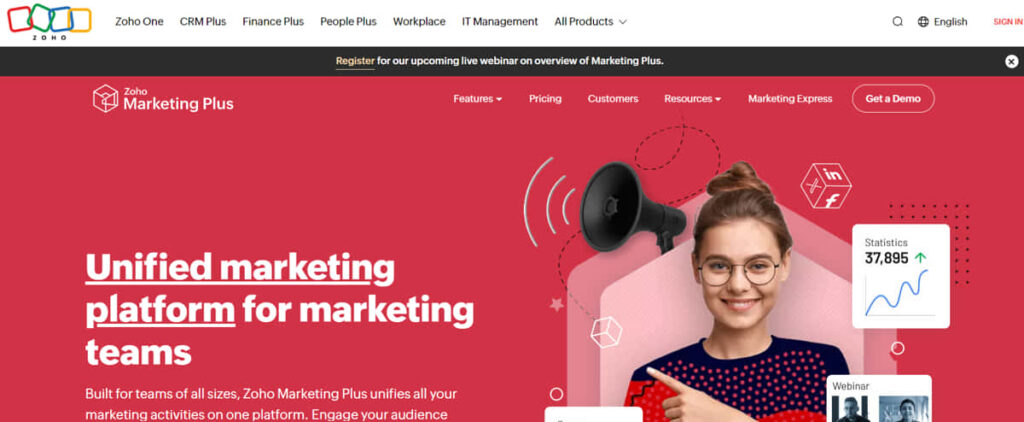
This tool also provides an analytics tool allowing you to detect the source of your traffic, determine the number of leads generated from each campaign, compare sales and service metrics, create cross-functional reports, etc. So if you are looking for content marketing analytics tools, give Zoho a try.
Zoho Marketing Plus Features
As we said, Zoho is known for a helpful website performance tracker but that’s not all. There are a lot more on this platform.
- Omnichannel Engagement
- Brand Asset Management
- Marketing Automation
- Campaign Management
- Marketing Analytics
- Budget Management
- Brand Management
Zoho Marketing Plus Pricing
For starters who don’t want to spend a lot of money, you can have everything you want in a single package with reasonable pricing. Zoho offers its services for $25 a month and there is a 15-day free trial.
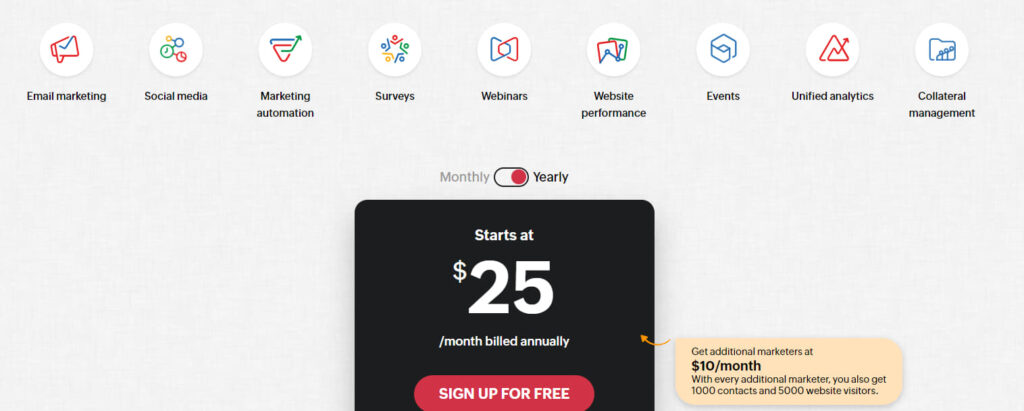
7. SimilarWeb
One of the easiest ways to find gaps in your strategy is by analyzing your top competitors and comparing your content. SimilarWeb is one of the tools for content marketing that allows you to monitor and analyze your competitive landscape. With its analyzer extension, you can access objective traffic data and insights into every website easily.
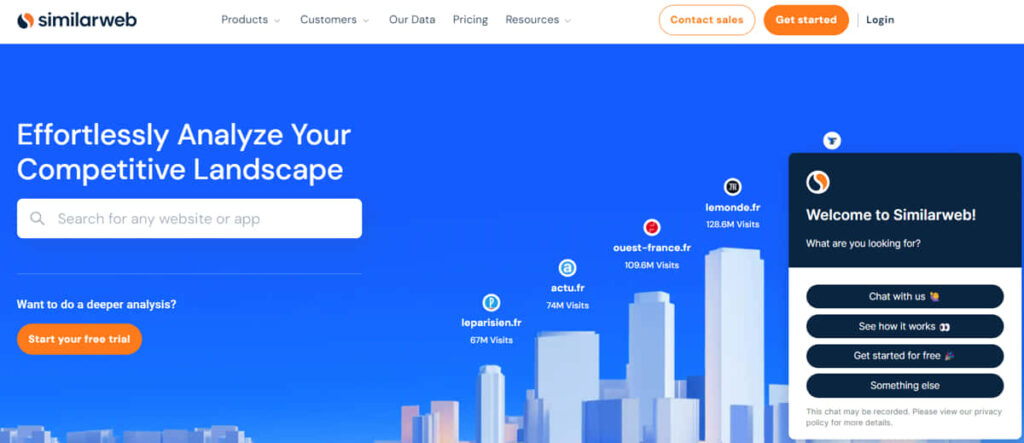
SimilarWeb Features
It’s not easy to find free content marketing tools but we can access some of them on SimilarWeb’s website. Here are some of its top features:
- Free tools such as free keyword generator, browser extension, SERP seismograph, etc.
- Digital research intelligence
- Digital marketing intelligence
- Sales Intelligence
- Stock intelligence
SimilarWeb Pricing
While you can always use SmilarWeb’s free content marketing tools, there are a lot more options to help your growth. If you like to use the premium features, here’s the pricing:
- Starter: $125/month – Up to 100 website results per table/ 1,000 keyword results per table
- Professional: $333/month – Up to 500 website results per table/ 5,000 keyword results per table
- Team: Custom pricing
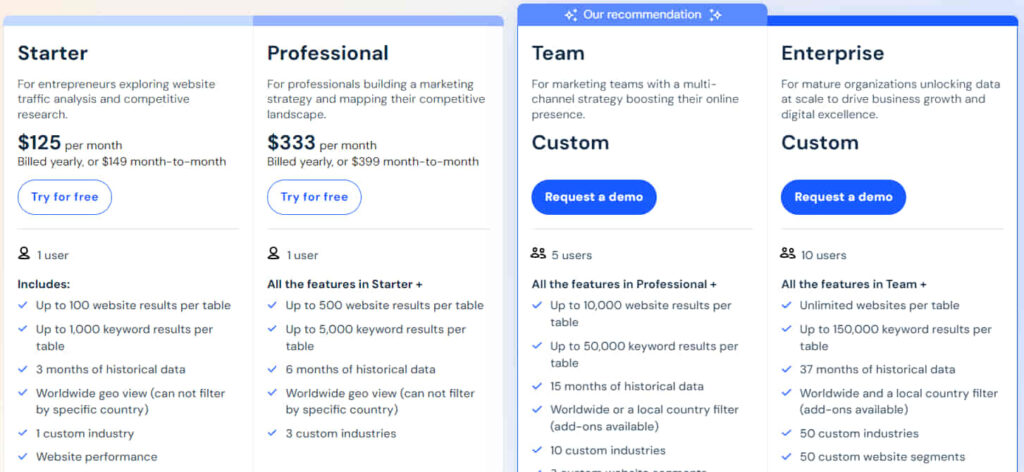
8. SquidVision
There is no better tool to boost your website’s revenue than SquidVision. XSquid Vision is the X-ray vision of your website helping you understand which pages are popular, what buttons your visitors click on, and detect pages with minimum interaction to improve.
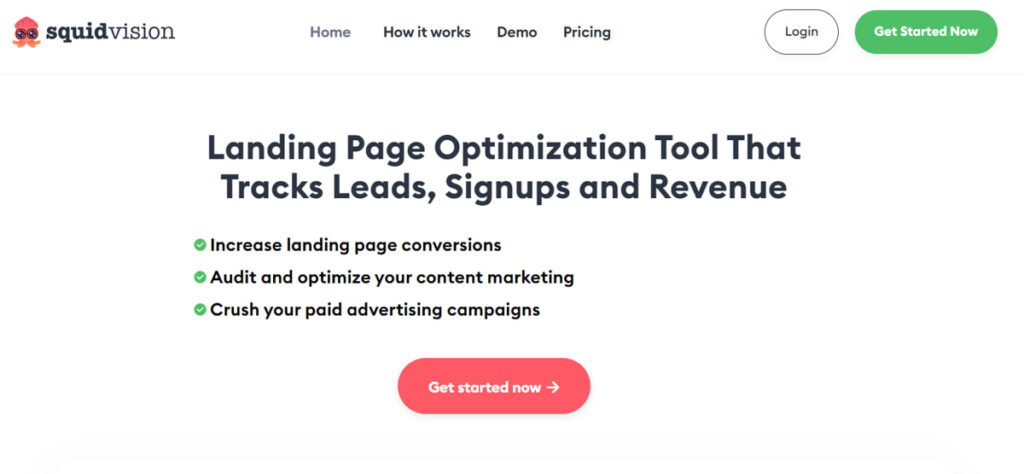
SquidVision Features
Let’s check why we call SparkToro one of the best content marketing analytics tools. Here is what it offers:
- Find out which buttons and links turn into money on each page.
- Check if your call-to-action buttons are working correctly.
- See the value of CTAs in your blog content.
- Access to in-depth revenue and click insights for every button and link.
SquidVision Pricing
Unfortunately, SparkToro doesn’t offer any free tools and plans but with reasonable pricing, you can access a lot of useful data.
- Porthole: $49/month – Current MRR: Up to $20K
- Clear Waters: $99/month – Current MRR: $20K-$100K
- Visionary: $199/month – Current MRR: $100K-$500K
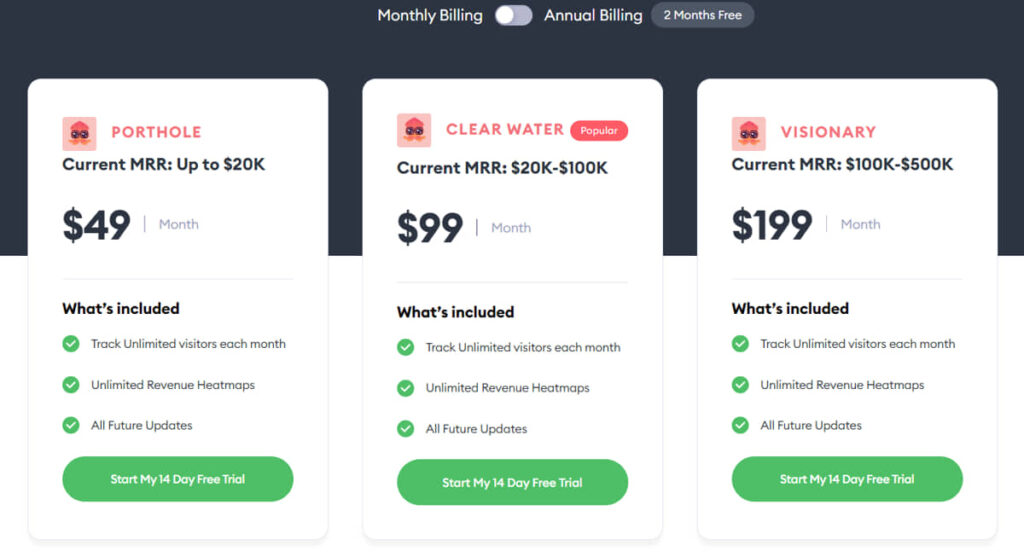
AI Content Marketing Tools
If you don’t have a lot of team members, don’t worry. You can leave some of your work to AI content marketing tools and focus on the most important parts. Here are some of the popular platforms that can help you.
9. ContentShake AI
Almost everyone is familiar with the power of SEO in helping a web page rank. However, you might not have enough team members to write ranking blogs. That’s why ContentShake AI is designed. This tool is one of the top AI content marketing tools that writes ranking articles based on competitor’s analysis.
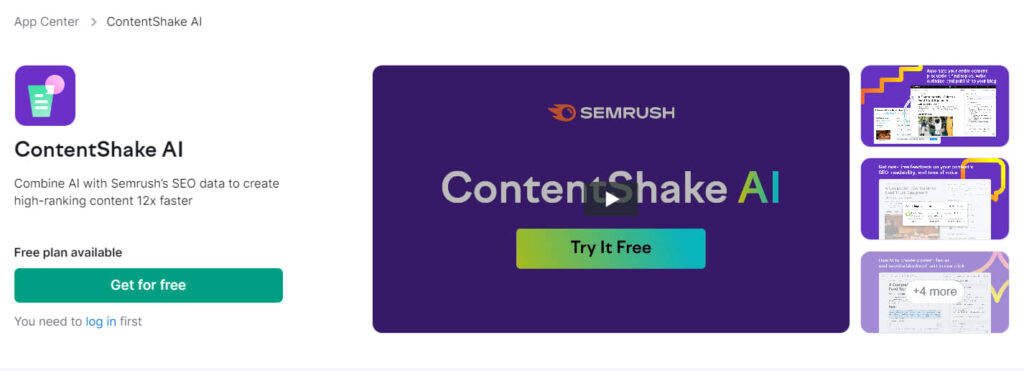
ContentShake AI Features
In the first look, ContentShake AI seems like a ChatGPT alternative; But it offers more features. You don’t have to use a keyword discovery tool anymore since this platform will do it for you. Here are the services it offers:
- Find resonating content ideas with a click.
- Create SEO-friendly content with AI and data provided by this tool.
- Generate social media posts and share them on your channels to help your growth.
ContentShake AI Pricing
Want to boost organic traffic with content marketing software tools? Give ContentShake AI a try for $60 per month.
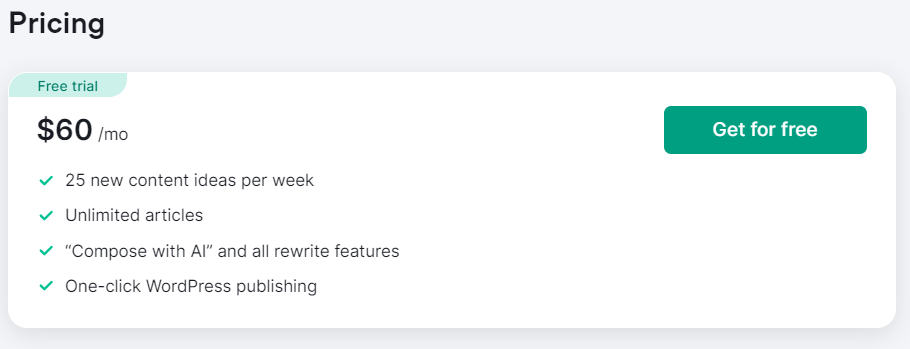
10. SparkToro
Founded by Casey Henry and Rand Fishkin, Spark Toto is a market research and audience research tool available for everyone with any budget. Spark Toto is one of the high-quality AI content marketing tools that helps you to know your audience better, find less competitive keywords, and rank for them.
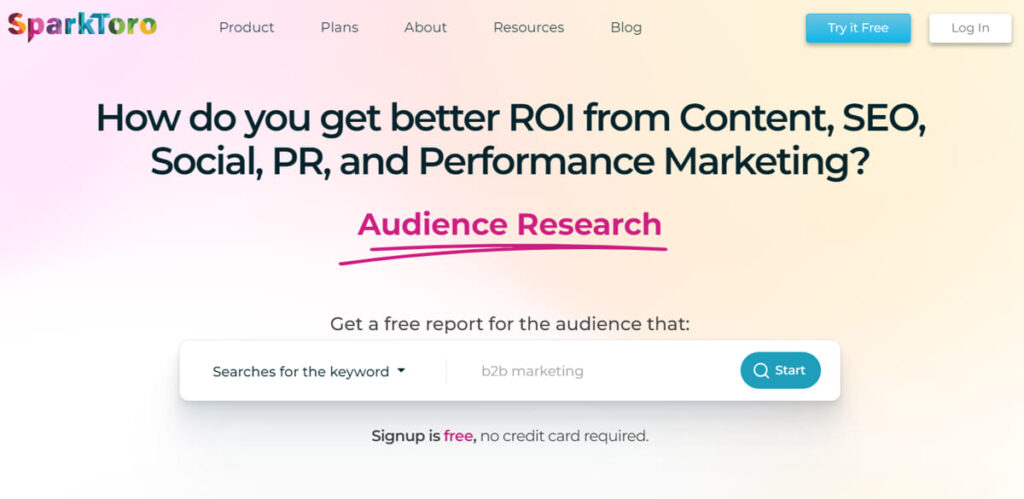
SparkToro Features
For content marketers and SEO specialists, you don’t need to do all the steps manually. You can leave keyword research and find affinities to trusted content marketing tools such as SparkToro. Here’s what it offers:
- Uncover Affinities: Find out which websites, podcasts, YouTube channels, Subreddits, and social networks your audience visits automatically.
- See Search Keywords: Discover keywords, trending keywords & questions they search for on Google.
- Find the Right Social Networks: Learn which social networks, financial, lifestyle, and e-commerce platforms are popular with them.
- Build & Export Lists: Get contact information for publications and people to reach out to for PR, partnerships, and ads.
- Create Data-Backed Personas: Gender, age, education, skills, interests, and more demographics for any searchable audience.
SparkToro Pricing
While SparkToro is one of the free content marketing tools, you don’t have full access to all the features in the free plan. You can upgrade to one of the below plans to access professional plans:
- Personal: $50/mo – 50 searches/month
- Business: $150/mo – 500 searches/month
- Agency: $300/mo – Unlimited* searches
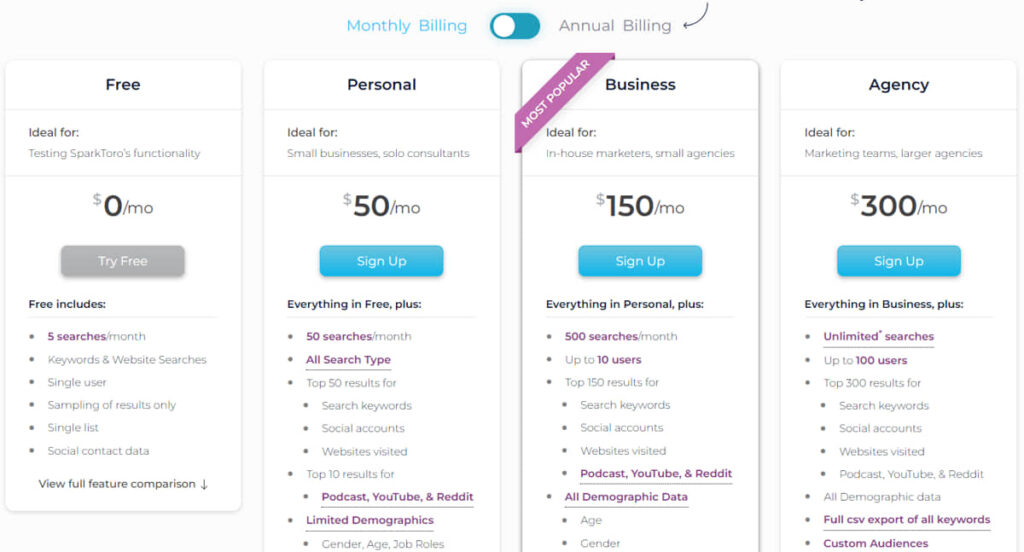
Conclusion
Content marketing tools have become essential for businesses and influencers to create engaging content and boost their online presence. Tools mentioned in this blog are just a few of the many available options for professionals to choose from. Each tool has its unique features and pricing plans for different needs and budgets.
FAQs
For influencers who want to grow on social media or businesses that are looking for new strategies to appear on SERPs, content marketing tools are a great solution. These tools have different features for content creation and SEO.
Before starting your content marketing, you need to plan ahead and know exactly what you are going to do. Here are the four important factors to consider:
Set clear goals,
Know your target audience and their interests,
Create content that is helpful for your audience,
Think about conversion.









